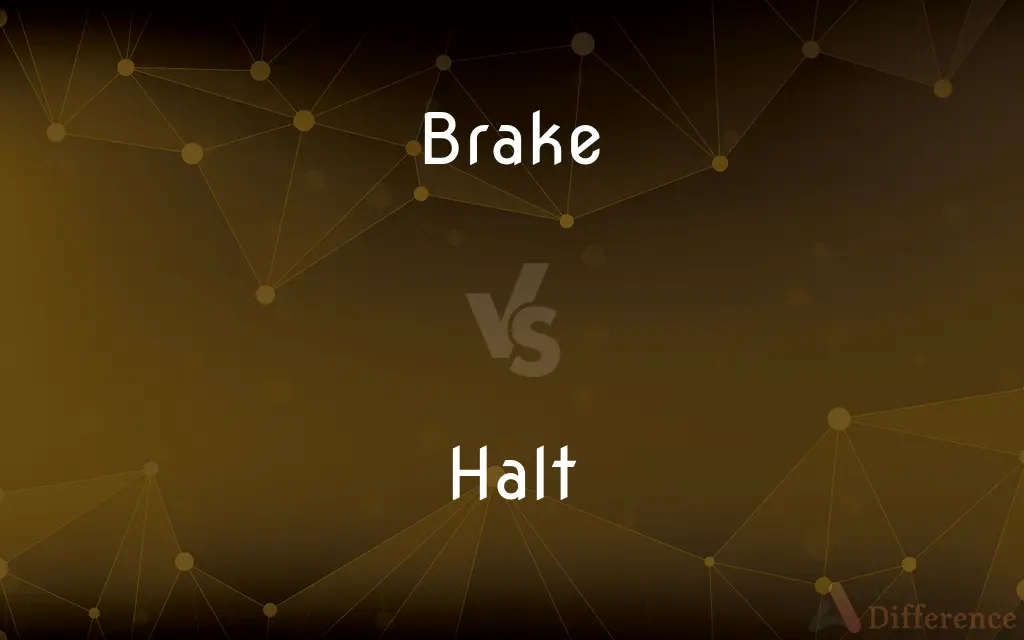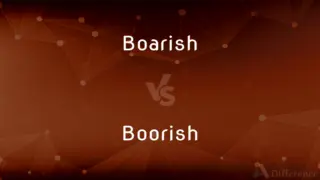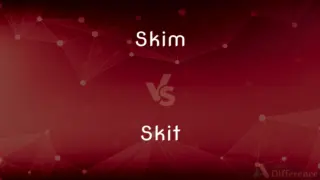Brake vs. Halt — What's the Difference?
By Tayyaba Rehman & Urooj Arif — Updated on April 4, 2024
Brake is a device for slowing or stopping a moving vehicle, typically by applying pressure to the wheels. Halt is a complete stop or pause in movement or activity, often sudden or temporary.

Difference Between Brake and Halt
Table of Contents
ADVERTISEMENT
Key Differences
Brake typically refers to the mechanism used to slow down or stop a vehicle or machinery by applying pressure to the wheels or a similar part. It is a physical component or system found in various types of vehicles, including cars, bikes, and trains. On the other hand, halt can refer to any stop or pause in movement, action, or operation, not just those involving vehicles.
The action of braking results in the reduction of speed or the complete stoppage of the vehicle. Halt is a broader term that can apply to people, processes, and activities beyond just stopping machinery or vehicles. For example, a business operation or a computer program can also come to a halt.
Brake is often used as both a noun and a verb. As a noun, it denotes the device itself that causes a vehicle to slow down or stop. As a verb, it refers to the action of operating this device. For instance, "to brake" means to apply the brake to slow down or stop. Whereas halt is primarily used as a verb meaning to stop or discontinue movement or activity. It can also be used as a noun to describe a stoppage, but this usage is less common. The term "halt" does not imply how the stoppage occurs, unlike "brake," which specifically involves the application of a braking system.
Brake systems are integral to the design and function of vehicles and machinery, requiring regular maintenance and checks to ensure safety and effectiveness. They can be mechanical, hydraulic, pneumatic, or electromagnetic, depending on the vehicle or machine's requirements. Halt, in contrast, does not refer to a specific mechanism or method. It can be voluntary, like stopping to rest during a hike, or involuntary, like a computer program ceasing to run due to an error. The context in which "halt" is used determines its specific meaning.
Comparison Chart
Definition
Device to slow/stop a vehicle
Complete stop/pause in movement or activity
ADVERTISEMENT
Usage
Noun and verb
Mainly verb, occasionally noun
Context
Vehicles, machinery
Broad, including people, processes, activities
Mechanism
Mechanical, hydraulic, etc.
Not mechanism-specific
Regularity
Requires maintenance
Can be voluntary or involuntary
Compare with Definitions
Brake
Act of using this device.
He had to brake suddenly at the intersection.
Halt
Command to stop.
The officer shouted, Halt! to the suspect.
Brake
Device for slowing/stopping a vehicle.
She pressed the brake to avoid hitting the dog.
Halt
To stop movement.
The train came to a halt at the station.
Brake
In machinery.
The emergency brake stopped the conveyor belt immediately.
Halt
End of operation.
The computer program halted unexpectedly.
Brake
Part of a bicycle.
Adjusting the bike's brake can improve safety.
Halt
Temporary stoppage.
Traffic was at a halt during the parade.
Brake
As a safety measure.
The car's brake system was tested for reliability.
Halt
Pause in activity.
Production came to a halt due to the power outage.
Brake
A brake is a mechanical device that inhibits motion by absorbing energy from a moving system. It is used for slowing or stopping a moving vehicle, wheel, axle, or to prevent its motion, most often accomplished by means of friction.
Halt
A suspension of movement or progress, especially a temporary one
The car rolled to a halt when it stalled.
Brake
A device for slowing or stopping a moving vehicle, typically by applying pressure to the wheels
He slammed on his brakes
A brake pedal
Halt
To cause to stop
The government hopes to halt tax fraud.
Brake
Another term for brake van
Halt
To stop; pause
The hikers halted for lunch and some rest.
Brake
An open horse-drawn carriage with four wheels.
Halt
To walk lamely or move in an irregular fashion.
Brake
A toothed instrument used for crushing flax and hemp.
Halt
To proceed or act with uncertainty or indecision; waver.
Brake
A thicket.
Halt
To be defective or proceed poorly, as in the development of an argument in logic or in the rhythmic structure of verse.
Brake
A coarse fern of warm and tropical countries, frequently having the fronds divided into long linear segments.
Halt
Lame; crippled.
Brake
Make a moving vehicle slow down or stop by using a brake
She had to brake hard to avoid a milk float
Halt
(intransitive) To limp; move with a limping gait.
Brake
A device for slowing or stopping motion, as of a vehicle, especially by contact friction.
Halt
(intransitive) To stand in doubt whether to proceed, or what to do; hesitate; be uncertain; linger; delay; mammer.
Brake
Something that slows or stops action.
Halt
(intransitive) To be lame, faulty, or defective, as in connection with ideas, or in measure, or in versification.
Brake
A toothed device for crushing and beating flax or hemp.
Halt
To waver.
Brake
A heavy harrow for breaking clods of earth.
Halt
To falter.
Brake
An apparatus for kneading large amounts of dough.
Halt
(intransitive) To stop marching.
Brake
A machine for bending and folding sheet metal.
Halt
(intransitive) To stop either temporarily or permanently.
Brake
A lever or handle on a machine such as a pump.
Halt
(transitive) To bring to a stop.
Brake
Any of various ferns of the genus Pteris having pinnately compound leaves and including several popular houseplants.
Halt
(transitive) To cause to discontinue.
The contract negotiations halted operations for at least a week.
Brake
Any of certain other ferns, such as bracken.
Halt
A cessation, either temporary or permanent.
The contract negotiations put a halt to operations.
Brake
An area overgrown with dense brushwood, briers, and undergrowth; a thicket.
Halt
(rail) A minor railway station (usually unstaffed) in the United Kingdom.
The halt itself never achieved much importance, even with workers coming to and from the adjacent works.
Brake
A high horse-drawn carriage with four wheels.
Halt
(dated) Lameness; a limp.
Brake
To reduce the speed of with or as if with a brake.
Halt
(archaic) Lame, limping.
Brake
To operate or apply a brake.
Halt
A stop in marching or walking, or in any action; arrest of progress.
Without any halt they marched.
[Lovers] soon in passion's war contest,Yet in their march soon make a halt.
Brake
To be slowed or stopped by or as if by the operation of a brake.
Halt
The act of limping; lameness.
Brake
To crush (flax or hemp) in a toothed device.
Halt
To hold one's self from proceeding; to hold up; to cease progress; to stop for a longer or shorter period; to come to a stop; to stand still.
Brake
To break up (clods of earth) with a harrow.
Halt
To stand in doubt whether to proceed, or what to do; to hesitate; to be uncertain.
How long halt ye between two opinions?
Brake
A past tense of break.
Halt
To cause to cease marching; to stop; as, the general halted his troops for refreshment.
Brake
A device used to slow or stop the motion of a wheel, or of a vehicle, usually by friction (although other resistive forces, such as electromagnetic fields or aerodynamic drag, can also be used); also, the controls or apparatus used to engage such a mechanism such as the pedal in a car.
Halt
To walk lamely; to limp.
Brake
The act of braking, of using a brake to slow down a machine or vehicle
Halt
To have an irregular rhythm; to be defective.
The blank verse shall halt for it.
Brake
(engineering) An apparatus for testing the power of a steam engine or other motor by weighing the amount of friction that the motor will overcome; a friction brake.
Halt
Halting or stopping in walking; lame.
Bring in hither the poor, and the maimed, and the halt, and the blind.
Brake
(figuratively) Something used to retard or stop some action, process etc.
Halt
The state of inactivity following an interruption;
The negotiations were in arrest
Held them in check
During the halt he got some lunch
The momentary stay enabled him to escape the blow
He spent the entire stop in his seat
Brake
(military) An ancient engine of war analogous to the crossbow and ballista.
Halt
The event of something ending;
It came to a stop at the bottom of the hill
Brake
(obsolete) The winch of a crossbow.
Halt
An interruption or temporary suspension of progress or movement;
A halt in the arms race
A nuclear freeze
Brake
The handle of a pump.
Halt
Cause to stop;
Halt the engines
Arrest the progress
Halt the presses
Brake
A baker's kneading trough.
Halt
Come to a halt, stop moving;
The car stopped
She stopped in front of a store window
Brake
A device used to confine or prevent the motion of an animal.
Halt
Stop from happening or developing;
Block his election
Halt the process
Brake
A frame for confining a refractory horse while the smith is shoeing him.
Halt
Disabled in the feet or legs;
A crippled soldier
A game leg
Brake
An enclosure to restrain cattle, horses, etc.
Brake
A cart or carriage without a body, used in breaking in horses.W
Brake
A carriage for transporting shooting parties and their equipment.W
Brake
That part of a carriage, as of a movable battery, or engine, which enables it to turn.
Brake
A fern; bracken (Pteridium).
Brake
Any fern in the genus Pteris
Brake
A thicket, or an area overgrown with briers etc.
Brake
A tool used for breaking flax or hemp.
Brake
A type of machine for bending sheet metal. (See wikipedia.)
Brake
A large, heavy harrow for breaking clods after ploughing; a drag.
Brake
(obsolete) A cage.
Brake
A type of torture instrument.
Brake
(intransitive) To operate (a) brake(s).
Brake
(intransitive) To be stopped or slowed (as if) by braking.
Brake
(transitive) To bruise and crush; to knead
The farmer's son brakes the flax while mother brakes the bread dough
Brake
(transitive) To pulverise with a harrow
Brake
(archaic) break
Brake
A fern of the genus Pteris, esp. the Pteris aquilina, common in almost all countries. It has solitary stems dividing into three principal branches. Less properly: Any fern.
Brake
A thicket; a place overgrown with shrubs and brambles, with undergrowth and ferns, or with canes.
Rounds rising hillocks, brakes obscure and rough,To shelter thee from tempest and from rain.
He stayed not for brake, and he stopped not for stone.
Brake
An instrument or machine to break or bruise the woody part of flax or hemp so that it may be separated from the fiber.
Brake
An extended handle by means of which a number of men can unite in working a pump, as in a fire engine.
Brake
A baker's kneading though.
Brake
A sharp bit or snaffle.
Pampered jades . . . which need nor break nor bit.
Brake
A frame for confining a refractory horse while the smith is shoeing him; also, an inclosure to restrain cattle, horses, etc.
A horse . . . which Philip had bought . . . and because of his fierceness kept him within a brake of iron bars.
Brake
That part of a carriage, as of a movable battery, or engine, which enables it to turn.
Brake
An ancient engine of war analogous to the crossbow and ballista.
Brake
A large, heavy harrow for breaking clods after plowing; a drag.
Brake
A piece of mechanism for retarding or stopping motion by friction, as of a carriage or railway car, by the pressure of rubbers against the wheels, or of clogs or ratchets against the track or roadway, or of a pivoted lever against a wheel or drum in a machine.
Brake
An apparatus for testing the power of a steam engine, or other motor, by weighing the amount of friction that the motor will overcome; a friction brake.
Brake
A cart or carriage without a body, used in breaking in horses.
Brake
An ancient instrument of torture.
Brake
A restraint used to slow or stop a vehicle
Brake
Any of various ferns of the genus Pteris having pinnately compound leaves and including several popular houseplants
Brake
Large coarse fern often several feet high; essentially weed ferns; cosmopolitan
Brake
An area thickly overgrown usually with one kind of plant
Brake
Stop travelling by applying a brake;
We had to brake suddenly when a chicken crossed the road
Brake
Cause to stop by applying the brakes;
Brake the car before you go into a curve
Common Curiosities
Can both "brake" and "halt" be used interchangeably?
They cannot be used interchangeably as "brake" specifically refers to a device or action in vehicles and machinery, while "halt" is more broadly used to denote any stop or pause.
What is the primary function of a brake?
A brake is designed to slow down or stop a vehicle or piece of machinery.
What types of braking systems are there?
Braking systems include mechanical, hydraulic, pneumatic, and electromagnetic types, among others.
Are brakes only found in vehicles?
While commonly associated with vehicles, brakes are also used in various types of machinery.
Does "halt" always imply a permanent stop?
No, "halt" can refer to both temporary pauses and permanent stops.
How does a hydraulic brake system work?
A hydraulic brake system works by transferring force from the brake pedal to the brake pads via brake fluid, causing the vehicle to slow down or stop.
Can braking be part of a safety system?
Yes, braking systems are essential safety features in vehicles and machinery to prevent accidents.
Can "halt" apply to non-physical processes?
Yes, "halt" can refer to stopping or pausing both physical movements and non-physical processes, such as a business operation.
Is maintenance necessary for all types of brakes?
Yes, regular maintenance is crucial for the safety and effectiveness of all types of braking systems.
Can the action of braking lead to a halt?
Yes, the action of braking can cause a vehicle or machine to come to a halt.
What happens when a process comes to a halt?
When a process halts, it stops moving or operating, either temporarily or permanently.
Is the use of "halt" in military contexts the same as in everyday language?
In military contexts, "halt" often serves as a command to stop immediately, which aligns with its general meaning but with a specific authoritative context.
Can a person halt?
Yes, a person can halt, meaning they stop moving or pause what they are doing.
What might cause a computer program to halt?
Errors, bugs, or external interruptions can cause a computer program to halt.
What does it mean when traffic comes to a halt?
It means that vehicles stop moving, usually due to congestion, a traffic signal, or an obstruction.
Share Your Discovery

Previous Comparison
Boarish vs. Boorish
Next Comparison
Skim vs. SkitAuthor Spotlight
Written by
Tayyaba RehmanTayyaba Rehman is a distinguished writer, currently serving as a primary contributor to askdifference.com. As a researcher in semantics and etymology, Tayyaba's passion for the complexity of languages and their distinctions has found a perfect home on the platform. Tayyaba delves into the intricacies of language, distinguishing between commonly confused words and phrases, thereby providing clarity for readers worldwide.
Co-written by
Urooj ArifUrooj is a skilled content writer at Ask Difference, known for her exceptional ability to simplify complex topics into engaging and informative content. With a passion for research and a flair for clear, concise writing, she consistently delivers articles that resonate with our diverse audience.














































